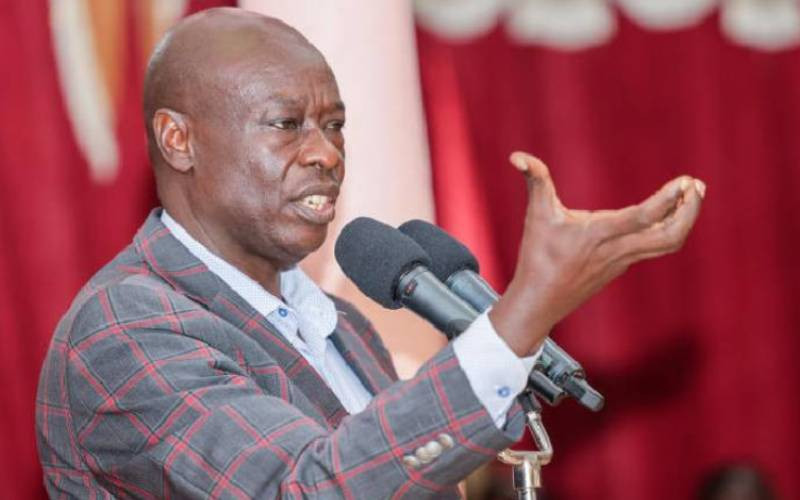President William Ruto will address a joint parliamentary sitting tomorrow, which heralds the commencement of the 13th Parliament.
Ruto is expected to explicitly state priorities for the first 100 days of his administration which will in turn inform Parliament’s legislative agenda.
According to the Kenya Kwanza manifesto, the incoming administration had pledged a raft of policies and projects, majority of which require legislative anchorage to achieve.
The Sh50 billion hustlers’ fund is the most notable; it will offer affordable financing to SMEs and create an avenue for job creation.
For this to be enacted, MPs allied to Kenya Kwanza are intent on implementing the right-to-work law that makes trading licence and provision of a trading location an entitlement to every citizen.
Ruto also promised to lower cost of living by implementing measures such as agricultural subsidy programmes and investment in agro-processing- which will quickly lower prices of basic commodities.
As he makes his maiden address to Parliament, he is expected to outline measures to spur investment in agriculture.
The Treasury has already released Sh3.55 billion to facilitate the procurement and distribution of subsidised fertiliser to farmers during the ongoing short rains.
Deputy President Rigathi Gachagua said the allocation was done to implement the Kenya Kwanza government’s ‘Fertiliser Subsidy Programme’ to distribute 1.4 million of 50kg bags to farmers.
“Agriculture remains the backbone of Kenya’s economic and industrial development particularly in food production, income generation and provision of raw materials for manufacturing,” said Gachagua.
Gender
President Ruto also pledged to ensure half of his Cabinet was comprised of women and would equally implement the elusive two-thirds gender rule for elected and appointive officials.
However, he failed to hounour this election pledge when he named his Cabinet on Tuesday where only seven women were nominated as Cabinet Secretaries.
It will be interesting to see how he achieves the two-thirds gender rule in Parliament. In the 2022 General Election, 29 women were elected as members of the National Assembly up from 23 in 2017 while seven women Deputy Governors and three women Senators were also elected.
“We will work with Parliament to fast-track various legislative proposals and establish a framework that will resolve this matter expeditiously. The participation of women in governance does not make us lesser; it makes us greater. And their role can no longer be nominal; it has to be substantive,” said Ruto a fortnight ago.
Moreover, the President’s pledge that Cabinet ministers in his government will physically appear in Parliament for grilling will require MPs to amend standing orders to allow for the same.
Former National Assembly speaker Justin Muturi said that Standing Order number 253, which deals with the admission of “strangers” to Parliament, needed to be amended to allow CSs to attend plenary sittings and provide information of public interest.
“It is possible to have Cabinet Secretaries appear for grilling in Parliament. All that needs to be done is to tinker with the Standing Orders to ensure that when they are summoned by Parliament, they are not considered strangers,” said Muturi.
Corruption
President Ruto is dealing with corruption and putting to an end what he defined as State capture.
The Head of State allocated his deputy Gachagua seven responsibilities. He has previously explained that this would avert a situation where the DP is sidelined as he was in the second term of President Uhuru Kenyatta’s administration. Ruto also honoured his deal with the Amani National Congress leader Musalia Mudavadi, nominating him as Prime Cabinet Secretary
Sports
The president further committed to improving the sports docket within the first 100 days by establishing an expert task force to identify sustainable sources of sports funding.
The force will also establish and resource adequately a dedicated function within the tourism promotion function to attract international sporting events, and leverage our international athletics brand to develop a domestic sports apparel manufacturing cluster.
Ruto further vowed to expand the National Youth Talent Academy, promote county leagues and inter-county sports championships and establish a sporting hero benevolent fund.
Moreover, the Head of State is intent on doing away with “regressive taxation, bureaucracy and regulatory compliance costs” all with the aid of legislators.
And in keeping by his manifesto, Ruto appointed six judges that were rejected by his predecessor. They are Court of Appeal judges Weldon Korir, Aggrey Muchelule, George Odunga and Joel Ngugi.
Two other judges, Makori Evans Kiago and Elizabeth Omange joined the Environment and Land Court.



















Discussion about this post